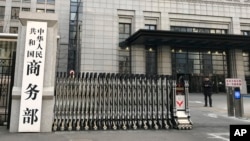Three days of trade talks in Beijing between the United States and China ended Wednesday with the White House expressing optimism.
"We expect something will come out of this," White House spokeswoman Sarah Sanders told the Fox Business Network. "We are moving towards a more balanced and reciprocal trade agreement with China."
But Sanders said no one knows yet what that agreement will look like or when it will be ready.
The U.S. Trade Representative's office gave no details on the talks in Beijing other than saying they are "focused on China's pledge to purchase a substantial amount of agricultural, energy, manufactured goods, and other products and services from the United States."
But it also said any deal with China must be followed up with ongoing verification and enforcement.
There was no comment from Beijing on the talks, which were supposed to last just two days, but were extended for a third day after progress was apparently being made.
These were the first direct talks between U.S. and Chinese officials since Presidents Donald Trump and Xi Jinping met in December in Argentina and agreed to a 90-day truce in their trade war.
Both sides imposed heavy tariffs on each others’ exports last year after Trump complained about China's theft of U.S. technology and pressure on U.S. companies doing business there to hand over such information.
The U.S. has also long complained about China's government subsidies that make Chinese products cheaper than U.S. goods on the world market.
China says it is trying to protect its own economic interests and has accused the U.S. of violating international trading rules.
Asian stocks surged at the conclusion of the trade negotiations. Hong Kong was up 2.1 percent and Tokyo up more than 1 percent.
But U.S. indexes posted modest gains.






